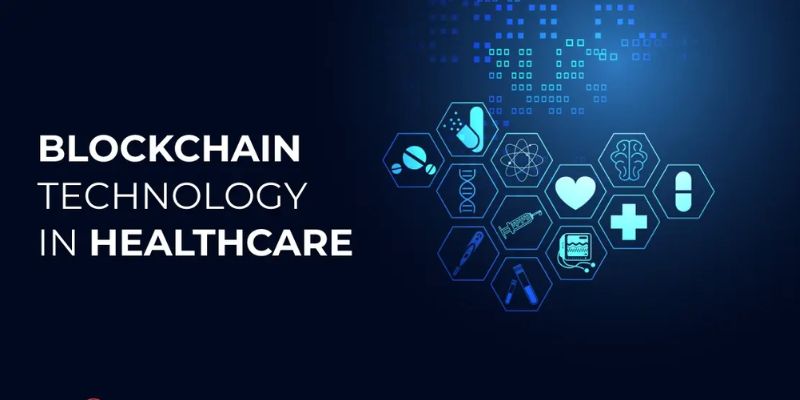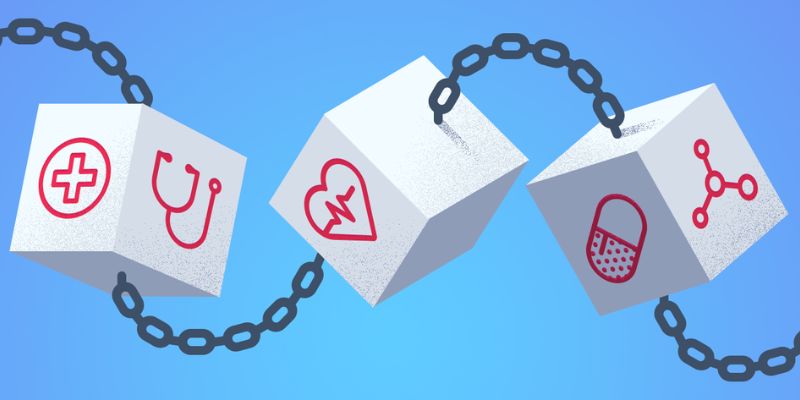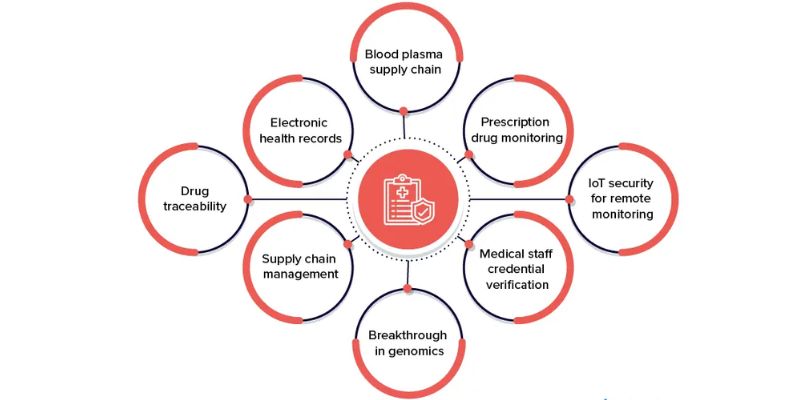Imagine your medical records as safe as Fort Knox. That’s what blockchain in healthcare is all about. It’s turning our need for bulletproof data security into a reality. Here’s the scoop: it shields patient info from hackers and prying eyes. We’re talking lock-down security for your health history, diagnoses, and treatments. No one sees your health secrets without your say-so. And better yet, you keep the key to your health data castle. Let’s dive into how this tech marvel is making waves in keeping our medical records under wraps.
Understanding the Impact of Blockchain on Medical Data Security and Privacy
Strengthening Protection Against Healthcare Data Breaches
We face a big problem with keeping medical data safe. Bad people often try to break into our health records. This is where blockchain can help. It makes a chain of data that nobody can change. Each piece of info gets its own block. It’s like locking your health records with a key that keeps changing. This way, even if someone gets in, they can’t change or steal your data.
Blockchain applications in medicine keep your info safe. They do this with lots of copies of the data. All spread out. When info changes, everyone must agree. This stops bad changes and keeps records correct. It can even tell us when something’s wrong. This helps us stop data breaches from hurting your privacy.
Upholding Health Record Confidentiality with Advanced Encryption
Your health records are very private. You may not want everyone to see them. Blockchain uses special math, called encryption, to keep them safe. It turns your records into secret codes. Only the people you choose can read these codes. It is like sending a locked box. Only the person with the key can open it. This way, we make sure nobody else peeks at your health info.
Advanced encryption keeps your records safe. When you go to the doctor or hospital, they store your info safely. They make sure it stays secret. This is good for keeping your trust. We know that health data is important. That’s why we use blockchain to take care of it.
Keeping your info safe helps everyone. You feel safe and doctors can do their job better. They can share info when they need to. This can help them take care of you faster. It can also stop mistakes that can happen when doctors don’t have the right info.
The smart part about blockchain is that it works without one big boss. No one person controls everything. This kind of system is called decentralized. It’s like a spiderweb. Strong, and connected everywhere.
With blockchain, we’re making sure that your health records can fight off data breaches. We use clever ways to keep your health records only for your eyes and those you trust.
Enhancing Healthcare Operations with Blockchain Technology
Fostering Blockchain Interoperability for Health Information Exchange
Imagine going to a doctor and they get your health info right away. No wait time. No errors. That’s what blockchain for healthcare interoperability does. It lets different systems talk to each other. It’s like building bridges on the internet to connect islands of patient data. Sounds cool, right?
With blockchain, hospitals and clinics can share records safe and fast. You don’t need to carry your health files anymore. Your data is on the blockchain. Doctors just need your permission to see it. This can help save lives. In emergencies, doctors can act fast with the right info.
Leveraging Smart Contracts to Improve Efficiency in Healthcare Services
Have you heard of smart contracts? They’re like robot helpers that live on the blockchain. They follow rules to get things done without a mistake. They can help in healthcare too.
Let’s say you need surgery. A smart contract could check your insurance. It can then send the bill. Everything’s done without papers. It saves time. No errors or fakes. Your surgery is set and ready to go.
These smart contracts for healthcare mean less time filling forms and more time getting better. They make sure doctors and patients are happy. Everyone knows what’s going on. Hospitals run smoothly. Health costs might even go down because things work better.
Blockchain is changing healthcare. It makes it safer and more connected. It’s time we all get on board.
The Role of Blockchain in Medical Supply Chain and Clinical Trials
Ensuring Transparency and Integrity in Pharmaceutical Traceability
When you take medicine, you trust it’s safe. But how can we be sure? Enter blockchain technology. It logs every step a medicine takes, from making to taking. Why is this good? It stops fake drugs. It makes sure the real deal gets to you.
Let’s talk “pharmaceutical traceability.” That’s a fancy way of saying knowing where drugs come from. Every time a drug moves, from factory to pharmacy, blockchain records it. No one can change these records. This means every pill can be traced back to where it started. If something’s wrong, you can find out where it happened and fix it.
This protects us all. When drugs are what they should be, people stay healthy. Plus, if bad drugs get out there, blockchain helps spot them fast. This keeps everyone safer.
Streamlining Clinical Trial Management With Decentralized Solutions
Now, let’s move to clinical trials. Before a drug hits the market, it goes through many tests. These tests are called “clinical trials.” They’re key to making sure drugs are safe and work well.
But these trials can be messy. Lots of data, lots of patients, lots of rules. Blockchain can clean this up. It makes a secure place to keep all the trial info. Only people who need to see it can. This helps keep patients’ details private.
Blockchain can make clinical trials fair, too. It keeps track of who gets what treatment. This can’t be changed either. It means the trial results are ones you can trust. The drugs proved to get the thumbs up really are top-notch.
And there’s more. During trials, sometimes patients don’t want to keep going. With blockchain, they can say “stop” in a way that’s secure and private. This helps manage consent—making sure patients agree to what they’re doing. It gives them power over their part in the trial.
Using blockchain is smart for trials. It makes them better and gives us all drugs we can count on. When these trials are clear and fair, it’s good for everyone involved.
In the end, blockchain is like a guard for our drugs and our health data. It looks out for us, making sure we’re getting the right stuff and that our info stays safe. It’s a strong, new helper in the medicine world, and it’s here to stay.
Blockchain’s Future in Patient-Centric Healthcare
Empowering Patients Through Blockchain-Enabled Telemedicine and PHR Security
Imagine a world where your health data is in your hands, always safe and sound. Thanks to blockchain, we are stepping into this new era where you control your personal health records (PHR). What’s blockchain? It’s a secure way of storing data that makes it hard to hack or change. With blockchain, telemedicine gets better. Doctors see your health info without worry. You can trust that no one else sees it unless you say so.
Why is this exciting for you? You get care faster and easier. No need for stacks of paperwork or stress about who sees your private info. Plus, you have no fears of someone stealing your health data. Blockchain guards it like a treasure. No one gets in without the key, which is your permission.
But how exactly does blockchain keep your records safe? It breaks up your info and spreads it out across many places. This way, a hacker can’t grab it all at once. Even if they take a piece, it’s useless alone. It’s like having a puzzle all over the world, and only you have the picture to put it together.
So, when you use telemedicine, your talks with your doctor stay between you two. People sometimes worry about online chats with doctors. Blockchain calms those worries. It makes sure only you and your doctor can unlock the conversation.
Innovating With Health Tech for Secure and Streamlined Healthcare Delivery
Let’s look at something cool: smart contracts. Smart contracts are like deals that live on the blockchain. They self-execute when certain conditions are met. For healthcare, this means less waiting and fewer errors. Say you need a test or treatment. The smart contract knows and speeds things up. It checks if you’re covered and can even help with payments. This means quicker care and less hassle for you.
These smart contracts also help manage who can access your medical data. They could let your doctor see your records for a check-up but keep them locked anytime else. This keeps your info under tight watch.
Another part of health tech is IoT, which means “Internet of Things.” It’s about connecting devices to the internet for better healthcare. For example, a wearable device measures your heart rate. It sends this info through the internet safely using blockchain. Your doctor sees it right away and makes quick, smart choices about your health.
All this innovation aims at one thing: making healthcare better and safer for you. With blockchain, we look at a brighter, safer future for your health data. We want to make sure you always feel in control and protected. That’s the power and promise of blockchain in healthcare.
To wrap up, we’ve seen how blockchain boosts security and privacy in healthcare. It strengthens data breach defenses and keeps health records safe with top-notch encryption. This tech also makes healthcare work better, with easy info sharing and smart contracts that speed up services. Plus, it brings trust and accuracy to the medicine supply chain and clinical trials.
Looking ahead, blockchain puts patients first, offering safer telemedicine and protected personal health records. It’s clear this tech is changing health care for the better, making it secure and efficient. Trust in blockchain for healthcare is growing strong. And that’s great news for everyone.
Remember, health data is precious, and protecting it matters. Blockchain is a powerful tool doing just that. Here’s to a safer, smoother future in healthcare thanks to blockchain!
Q&A :
How is Blockchain Being Used in Healthcare?
Blockchain technology in healthcare is employed to increase data security, improve the integrity of medical records, and enhance patient privacy. It enables secure, immutable, and interoperable data sharing across various healthcare stakeholders, facilitating efficient and transparent access to medical records, insurance information, and supply chain management for pharmaceuticals.
What Benefits Does Blockchain Offer to Healthcare Data Management?
Blockchain offers several significant benefits to healthcare data management, including enhanced security and privacy of patient data, reduced occurrences of fraudulent activities, streamlined processes through smart contracts, and robust data integrity due to its immutable nature. This fosters a more reliable and trustworthy environment for managing sensitive health information.
Can Blockchain Technology Ensure the Privacy of Health Records?
Yes, blockchain technology can ensure the privacy of health records through its cryptographic features. Each block of data is securely encrypted and spread across a network, making unauthorized access exceedingly difficult. Furthermore, blockchain enables selective sharing of health data, where patients can control who gets access to their medical information.
What Challenges Are Associated with Implementing Blockchain in Healthcare?
Challenges associated with implementing blockchain in healthcare include technology integration with existing systems, regulatory compliance, scalability issues, and ensuring all participants in the healthcare ecosystem are on board. Costs of adoption and a limited understanding of blockchain technology also pose significant hurdles.
How Does Blockchain Impact Patient-Centered Care?
Blockchain positively impacts patient-centered care by empowering patients with control over their medical data and providing a comprehensive, tamper-evidence record of their health history. This fosters a participatory healthcare model where patients can give consent for data sharing and engage more actively in their healthcare decisions.



